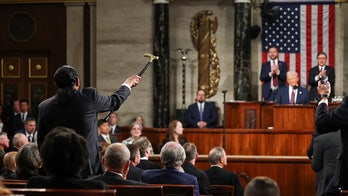
Elizabeth Torres, partidaria del fallecido presidente venezolano Hugo Chávez, visita una capilla levantada en honor del mandatario en el barrio pobre 23 de Enero, en Caracas, Venezuela, el miércoles 3 de abril de 2013. Este santuario, de nombre âSanto Hugo Chávez del 23â, ha sido visitado por decenas de miles de venezolanos para rendir homenaje al que fue presidente para unos, santo para otros. (Foto AP/Fernando Llano) ((Photo AP/Fernando Llano))
Five charter planes will take off from South Florida Sunday morning and will land over 800 miles away in New Orleans with 850 Venezuelan expatriates determined to vote in Venezuela's presidential election.
"Right now, we have the best opportunity that we have had to create change for Venezuela," said Andres Morrison, an expatriate of Venezuela living in Miami.
For the first time in 14 years, more than 15 million Venezuelans will cast their vote on a ballot absent Hugo Chávez's name.
Chávez won the last election of his life in October, by 1.5 million votes, before succumbing to cancer last month. He defeated opposition candidate Henrique Capriles, a state governor.
But those results have not deterred the 36,915 Venezuelan expatriates registered to vote in the United States, barely enough to fill a baseball stadium, who view Sunday's Venezuelan presidential election as a historic moment.
"You can never give up fighting for your country and democracy," Morrison told Fox News Latino.
Morrison, a 35-year-old industrial engineer, is one of an estimated 20,000 Venezuelan expatriates in the Miami area in South Florida and one of an estimated 10,000 or so Floridan voters who will drive or fly to New Orleans to cast their ballots. Following Chávez's decision to close down the Miami consulate in 2012, these Venezuelans, who heavily vote for the opposition, will have to journey to the New Orleans consulate to vote on Sunday..
Chávez's decision to close down the consulate was viewed by expatriates as an underhanded method to cut down expatriate voting from the United States. In 2012, Chávez won only 2 percent of the Venezuelan vote in the United States, while 97 percent voted for opposition candidate Capriles.
Despite Chávez's attempts to silence Miami's Venezuelan community, Morrison, who grew up in Caracas, together with his childhood friend Andres Casanova, co-founded the non-partisan non-profit, the Venevox Foundation, and began the initiative Aerovotar in 2012.
In just four months before the October election, both men organized chartered airplanes and flew 1,212 Venezuelan expatriates, many elderly and handicapped, to the New Orleans Venezuelan consulate to cast their votes.
This year, Aerovotar offers subsidized ticket fares funded by donations aboard five charter planes purposely named Democracy, Justice, Union, Liberty and Security. However, this year Chávez's sudden death has meant left less time to raise funds and less people to fly to New Orleans.
"We do understand that 10,000 votes is not going to make a difference in the overall election," Morrison told Fox News Latino. "It's not necessarily for the vote, it's about the government trying to take our vote from us."
Morrison hopes to one day be able to fly 3,000 Venezuelan expatriates to the polls in the next election.
Every Vote Counts
The last time the opposition movement against Chávez decided not to vote was in 2005 during assembly elections in Venezuela.
"By boycotting the election, their voice wasn’t heard, and a whole series of the Chavista revolution was implemented, with no opposition fighting it along the way," said Larry Birns, director of the Council on Hemispheric Affairs.
It's a lesson that Morrison has not forgotten.
"That allowed the government to basically pass any law, they had the majority vote of every single reform," he said.
The first election of the Post-Chávez era has energized the opposition in Venezuela who are optimistic that Chávez's hand-picked successor Nicolas Maduro will be unable to continue the Chavismo Revolution. Heading into Sunday's election, the popular sentiment was that Chávez supporters, who are overwhelmed by emotion following their leader's death, would carry Nicolás Maduro to an easy victory over Capriles.
But that has changed.
"There is a feel right now that this is an election that might be interesting," said David Smilde, Senior Fellow at the Washington Office of Latin America, from Caracas. "The opposition are more enthusiastic than they ever have been."
Smilde acknowledges that Maduro is a clear favorite but stresses the Venezuelan expatriate vote in the United States is more important than ever because Sunday's election is not only about who wins but it's also about the vote count.
"That's really what this election is all about. Not if Maduro wins but by what margin," Smilde explained to Fox News Latino. "If he wins by 11 percent or more, then people will say he is our leader. But if he wins in the single digits, then that will energize the opposition and it could spell problems in Maduro's own coalition."
Maduro, a former bus driver, is an untested leader and that has ushered in uncertainty even from Chávez supporters.
"They don't like Maduro, they may not vote for him and we have an opportunity to get more than 6.5 million votes," Morrison said. "As the gap narrows, the value of every single vote increases."
Follow us on twitter.com/foxnewslatino
Like us at facebook.com/foxnewslatino












































